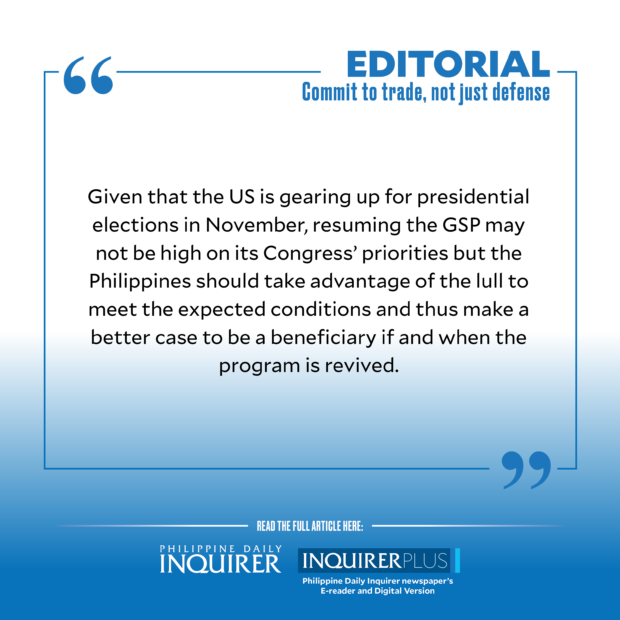Commit to trade, not just defense

United States President Joe Biden said in no uncertain terms last week during the first trilateral summit with Japan and the Philippines that its commitment to the country’s defense was “ironclad,” and had even sought $128 million from the US Congress to execute projects for the Enhanced Defense Cooperation Agreement sites.
Now the Philippines is seeking the same level of firm commitment from the US government in trade and commerce.
This through the revival of the US Generalized System of Preferences (GSP) that granted duty-free privileges to more than 3,500 exports from the Philippines, and the forging of a bilateral free trade pact that will help the country’s economy grow faster and thus enable more Filipinos to get out from under crushing poverty.
Economic integration
President Marcos emphasized during the recent business forum in Washington that the relationship with the US will be sustained not only through a stronger security and defense alliance, but also through even closer economic integration.
“For this reason, we appeal to the US Congress to fast-track the reauthorization of the US GSP program which has benefited beneficiary countries such as the Philippines,” said Mr. Marcos.
The GSP is the oldest and largest American trade preference program, established through the Trade Act of 1974, to promote economic development in select countries by removing duties on thousands of their products entering the large US market.
At the time that the program ended in 2020, the Philippines was its fifth largest beneficiary, behind Thailand, Indonesia, Brazil, and Cambodia, thus Mr. Marcos’ call for the renewal of the program was necessary and timely given the relations with the US that had decidedly become warmer since he became president in 2022.
Bipartisan interest
The GSP program covered a total of 5,057 products or tariff lines or close to half of the 10,600 total US tariff lines, according to data from the Department of Trade and Industry.
As of 2019, Philippine top exports under the GSP program include pneumatic rubber tires, insulated electric conductors, cane sugar, telescopic sights for rifles, hairdryers, leather and plastic handbags, and nonalcoholic beverages.
A US think tank had said that there had been bipartisan interest to reauthorize the GSP but legislators now want firm caveats, which should then signal to the Philippines that it should level up if it wants to again be eligible for the GSP should it be again renewed.
These proposed conditions tied to the GSP include protection of intellectual property rights, upholding of workers’ and human rights, protection against child labor, enforcement of international agreements, good governance, digital trade, and amendments of value limits placed on certain products, according to the November 2023 paper of the US Congressional Research Service.
‘Positive change of direction’
There have also been proposals to include environment and sustainability criteria under the trade preference program as the US leverages on its trade policies to advance its social agenda.
Broadly, these are the same conditions sought by the European Union (EU), which has fortunately signaled the resumption of free trade talks with the Philippines last March due to the “positive change of direction” in human and labor rights under Mr. Marcos.
To recall, trade and diplomatic relations between the Philippines and the European trading bloc that is also the country’s fourth largest trade partner soured during the administration of then President Rodrigo Duterte due to the bloody war on illegal drugs. Duterte also pivoted away from the US and instead embraced China, which has only become more brazen with its frequent and brazen incursions into the West Philippine Sea.
Mr. Marcos has since reset the policy and diplomatic direction and it has been paying dividends, with the resumption of negotiations for “an ambitious, modern, and balanced free trade agreement (FTA)” with the EU and pledges of billions of dollars worth of investments from the US private sector.
Major market
Hopes are high therefore that the US government will likewise appreciate the policy change and kick-start talks under a bilateral trade and investment framework agreement.After all, the US also stands to benefit with the Philippines being a major market for US products.
“The benefits for concluding an FTA together with a Critical Minerals Agreement between both our countries will be transformative and will create new jobs, strengthen supply chains, establish new businesses, and upskill our workforce,” Mr. Marcos said.
Given that the US is gearing up for presidential elections in November, resuming the GSP may not be high on its Congress’ priorities but the Philippines should take advantage of the lull to meet the expected conditions and thus make a better case to be a beneficiary if and when the program is revived.




















